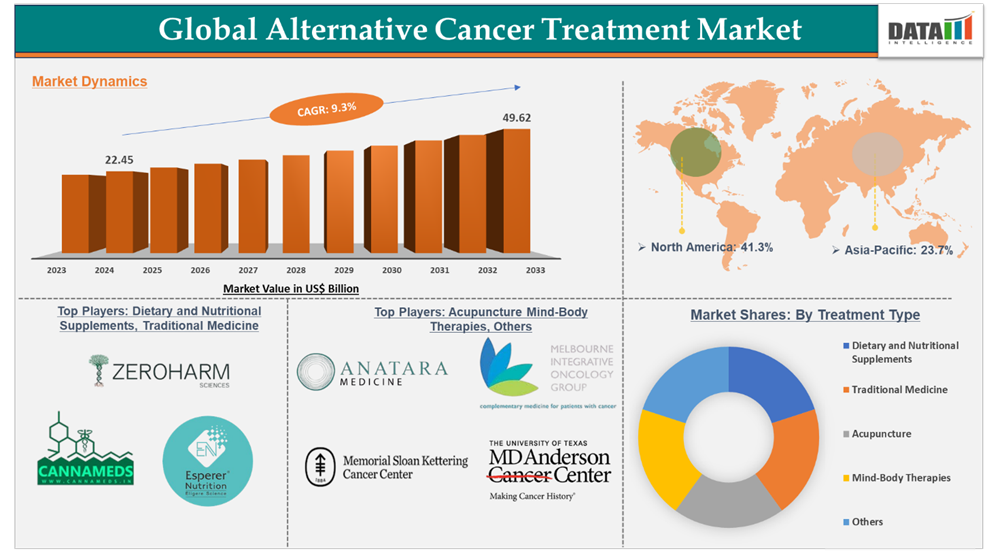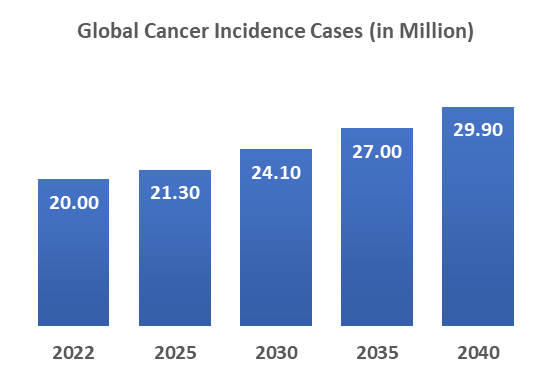Alternative Cancer Treatment Market Overview
Alternative Cancer Treatment Market reached US$ 22.45 billion in 2024 and is expected to reach US$ 49.62 billion by 2033, growing at a CAGR of 9.3% during the forecast period 2025-2033.
Alternative cancer treatment encompasses a variety of therapies and practices that are not part of conventional cancer care. These treatments are often sought by patients looking for complementary options to manage symptoms and improve quality of life.
The alternative cancer treatment market is diverse, reflecting a wide range of approaches from herbal remedies to holistic practices. The alternative cancer treatment market is experiencing significant growth due to the rising prevalence of cancer, increasing demand from cancer patients for alternative approaches to improve their outcomes, etc. However, the Lack of clinical validation can significantly hinder their adoption.
Executive Summary

For more details on this report – Request for Sample
Alternative Cancer Treatment Market Dynamics: Drivers & Restraints
The rising incidence and prevalence of cancer are driving the market growth
Cancer is one of the major global health concerns, with a substantially high number of cases worldwide. The rising burden of cancer is expected to significantly drive the alternative cancer treatment market as more patients seek complementary therapies to manage their conditions. As per the International Agency for Research on Cancer, globally, nearly 20 million incident cases were reported in 2022. In 2030, nearly 24.10 million cases and in 2040, nearly 29.90 million cases were expected.

As cancer incidence continues to grow, patients are increasingly exploring alternative treatments such as dietary supplements, acupuncture, and herbal remedies to alleviate symptoms and improve quality of life. This shift is fueled by a desire for holistic care approaches that address not only the disease but also the emotional and physical well-being of patients. Additionally, the limitations of conventional treatments such as side effects and high costs prompt patients to consider alternative options as viable adjuncts to their primary care.
Lack of clinical validation may restrain the market growth
Alternative cancer treatments, also known as complementary alternative medicine (CAM), consist of a broad range of therapies like herbal medicine, dietary supplements, acupuncture, yoga, etc. These therapies are gaining huge popularity among cancer patients, who seek to alleviate their symptoms using holistic approaches. However, their clinical efficacy is not been proven to be beneficial in the treatment or curing any type of cancer. These therapies alone do not improve the patient's prognosis and often lead to worsening of the condition. Certain herbal medications can also interact with standard of care drugs and produce more side effects than intended. It is always a recommended practice to consult a physician or, oncologist before administering or following alternative cancer treatments. Several advancements have come in recent times, like targeted therapies, immunotherapies, which are widely studied in large-scale clinical trials and have proven a safe and efficacy profile. These therapies can overshadow alternative therapies that often lack rigorous clinical evidence.
Alternative Cancer Treatment Market Segment Analysis
The global alternative cancer treatment market is segmented based on treatment type, indication, and region.
Mind-body therapies in the treatment type segment accounted for 52.4% of the market share in 2024 in the global alternative cancer treatment market
Mind-body therapies include meditation, mindfulness-based stress reduction, yoga, tai chi, exercise and physical consultation, music therapy, massage therapy, etc. These therapies have gained huge attention due to their ability to help cancer patients manage their stress, anxiety, fatigue, pain, insomnia, etc, created during cancer treatments. Although these therapies have no interventional role in treating cancer, they improve the overall emotional, psychological, and physical well-being of a cancer patient. A new treatment approach called integrative therapies has evolved as one of the most effective ways to treat cancer. These integrative therapies combine standard of care treatments with alternative treatments like mind-body therapies. Several clinical practice guidelines have recommended integrative therapies to improve overall patient outcomes.
For Instance, the Society for Integrative Oncology (SIO) and American Society of Clinical Oncology (ASCO) have established guidelines for the management of anxiety, depression, fatigue, and the use of cannabinoids and cannabis in cancer patients. The guidelines offer evidence-based suggestions for supplementing traditional cancer treatment with integrative modalities to improve results and quality of life. The guidelines advise against utilizing cannabis or cannabinoids as cancer-directed treatments until they have been scientifically evaluated and instead suggest mindfulness-based stress reduction, cognitive therapy, and tai chi as ways to manage cancer fatigue. These recommendations to use mind-body therapies can significantly enhance their practice among cancer patients in the future.
Alternative Cancer Treatment Market Geographical Analysis
North America dominated the alternative cancer treatment market with the highest share of 41.3% in 2024
North America is expected to hold a significant position in the global alternative cancer treatment market due to several key factors. The region benefits from a high level of patient awareness regarding various cancer treatments, including alternative and complementary therapies, which fosters a more informed consumer base. Additionally, the presence of numerous market players and healthcare institutions that actively promote and research alternative therapies contributes to the region's dominance.
The increasing prevalence of cancer, coupled with a growing preference for holistic and personalized medicine approaches, drives demand for alternative treatments. For instance, A cohort study conducted on cancer patients published in the American Society of Clinical Oncology journal in June 2023, has stated that the prevalence of complementary alternative medicine (CAM) was 66.11%. This reflects that a major proportion of the cancer population in the United States is aware of these alternative approaches. Moreover, reputed cancer care centers in the United States, such as Memorial Sloan Kettering Cancer Center, The University of Texas MD Anderson Cancer Center, etc, offer integrative oncology care to their patients, where complementary alternative medicine plays a crucial role. These cancer centers offer clinical services like acupuncture, exercise and physical activity consultations, health psychology, meditation, music therapy, nutrition consultations, and oncology massage to cancer patients.
The higher awareness of these holistic treatment approaches among U.S. cancer patients, combined with the integration of complementary therapies into care models at leading cancer institutions, reflects the higher practice rate for alternative cancer treatment.
Alternative Cancer Treatment Market Major Players
The major players in the Alternative cancer treatment market are ZEROHARM Sciences, CannaMeds India, Niche Agriculture And Pharmaceuticals Limited. (Kief Wellness), Esperer Nutrition, Jeena Sikho, Carctol, Anatara Medicine, Melbourne Integrative Oncology Group, Memorial Sloan Kettering Cancer Center, and The University of Texas MD Anderson Cancer Center, among others.
Market Scope
Metrics | Details | |
CAGR | 9.3% | |
Market Size Available for Years | 2022-2033 | |
Estimation Forecast Period | 2025-2033 | |
Revenue Units | Value (US$ Mn) | |
Segments Covered | Treatment Type | Dietary and Nutritional Supplements, Traditional Medicine, Acupuncture, Mind-Body Therapies, and Others |
Indication | Breast Cancer, Gynecological Cancers, Lung Cancer, Brain Cancer, and Others | |
Regions Covered | North America, Europe, Asia-Pacific, South America, and the Middle East & Africa | |